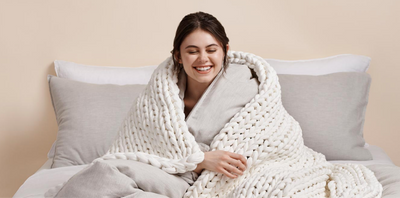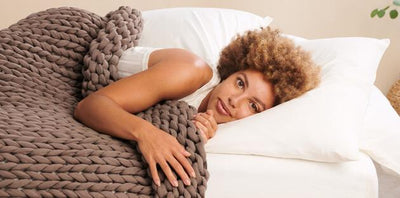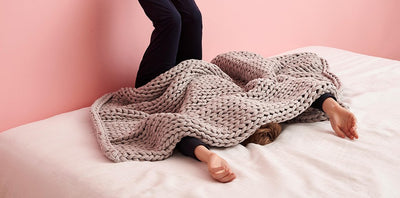Is It Bad To Sleep With A Weighted Blanket?
You may have heard about weighted blankets from family, friends, or social media influencers. People often say that weighted blankets will help you get better sleep, feel more rested, or even become less stressed. You might find yourself wondering why.

Bearassentials
There is no indication that weighted blankets place unnecessary strain on the joints when selecting the appropriate weight.
Weighted chain blankets are a proven and safe intervention for people with different disorders like depression, bipolar, anxiety and more.
Weighted blankets might prove helpful for people with sleep apnea.
Did you know?
There are now several studies that assess the effectiveness of weighted blankets. They have been shown to help with a variety of disorders.
We all have busy lives that can sometimes be unpredictable. Many of us go to bed flat out exhausted. The one thing we crave most when we are lying comfortably in bed is a good night’s sleep. Could weighted blankets be a solution?
What Is The Right Amount Of Sleep?
How many hours of sleep do experts recommend? The range is between 7 to 9 hours for adults. If you want to wake up feeling refreshed the next morning with enough energy to tackle your day with strength and gusto, you need to make sure you have enough hours of sleep.
It is not enough to just have the right number of hours of sleep; we also need to think about the quality of those 7 to 9 hours of sleep. It is no use lying in bed for hours on end if your mind is racing restlessly.
You want to make sure that when you plan to sleep you do, in fact, sleep. That means an undisturbed period of rest. High-quality sleep: a period of total silence and total relaxation.

What Can Help Me Sleep Through The Night?
For many of us, achieving this state of mind can be challenging. Even in the middle of the night, many things can still distract us: our children, out-of-work emails, social media, and so on.
If you find it challenging to sleep through the night, you might have tried various sleeping aids to help you relax. You may have tried using earplugs or playing sleep music. You may have tried using essential oils to help you relax. And you may have even tried using a weighted blanket to help you sleep better.
Weighted blankets are all the rage right now. Sleep researchers are studying the effects of weighted blankets on sleep in greater and greater detail. You may even have heard testimonials from friends about the wonders of using a weighted blanket at night. Some have called weighted blankets a “cure-all” for ailments such as anxiety and muscle soreness.
However, when hearing unusually good news about a product, a natural instinct kicks in: the instinct to question if something is indeed too good to be true. The life adage “if something is too good to be true, it usually is,” has often proven to be correct.
How well do weighted blankets stack up against the hype? Is it possible that they may be harmful? Is it bad to sleep with a weighted blanket or can it help you sleep through the night?
Let’s examine a few common concerns about the safety of weighted blankets and look at the evidence.
Can Weighted Blankets Be Too Heavy?
There have been some concerns that weighted blankets are bad for you because they are too heavy. The fear is that weighted blankets put unnecessary pressure on your body, especially on your joints. Some worry that this may lead to joint pain over time.
It is indeed true that putting excessive pressure on your joints can damage them. For example, people who lift heavy weights using incorrect techniques may find themselves feeling pain in their joints over time. In addition, people who are obese are at a higher risk of experiencing joint pain.
An article by the Harvard Health Publishing reads: “Being overweight raises your risk for developing osteoarthritis (the most common joint disorder, which is due to wear and tear on a joint).”
So do weighted blankets put unnecessary pressure on the joints? The answer is no: there is simply no evidence that they do so when you choose the right weight. Our cozy Cotton Napper weighs between 10 lbs to 25 lbs, and we generally recommend choosing a size that’s approximately 10% of your body weight. Keep in mind that the weight is spread evenly throughout the surface area of the entire weighted blanket.
In addition, you are lying flat down with the weighted blanket over you; you are not moving your joints against the pressure of the blanket like you would do at the gym. Therefore, weighted blankets give you the comforting sensation of being grounded without causing any damage to your joints.
The rule of thumb is that your weighted blanket weight should be 10% of your body weight, but if you want to find out which weight is right for you, check out our weighted blanket weight size chart.
Cotton Napper

Dreamy, buttery softness
Calms body & mind for deeper sleep
Hand-knitted huggable comfort
It's Napper Time
Are Weighted Blankets Evidence-Based?
The popularity of weighted blankets has soared only in the past few years. They have been used by influencers, athletes, and healthcare professionals. If you follow social media accounts on sleep, chances are you would have seen weighted blankets pop up on your newsfeed a few times.
Like with any relatively new hype, there is a natural worry that a product is claiming to do more than it actually can. For example, in the health and wellness sector, certain “miracle” diets have shot up in popularity, only to be proven to be more hype than substance when studied by scientists.
So are weighted blankets just another clever marketing ploy? Does making a blanket a little heavier really make a difference in terms of anxiety reduction and sleep quality? What does current research tell us?
Weighted blankets have been used since the 1990s, and the good news is that scientists have researched the benefits of weighted blankets and have reached conclusions that should give us hope. A team of researchers studied the use of weighted chain blankets for insomnia in psychiatric disorders.
Their conclusion? “Weighted chain blankets are an effective and safe intervention for insomnia in patients with major depressive disorder, bipolar disorder, generalized anxiety disorder, or attention deficit hyperactivity disorder, also improving daytime symptoms and levels of activity,” they wrote.
Another team of researchers studied the use of weighted blankets to reduce anxiety in an inpatient mental health hospital. They concluded, “The use of weighted blankets is a safe and potentially effective way to help individuals in a psychiatric facility manage anxiety.”
Hence, we can safely conclude that the health benefits of weighted blankets are indeed evidence-based and that they do improve the mental and physical well-being of users.
Can Weighted Blankets Cause Snoring?
There is a medical condition known as obstructive sleep apnea in which a person’s breathing starts and stops during sleep. This happens because the airways are getting blocked and unblocked throughout the night. The most common problem that can cause this is snoring.
In more severe cases, patients can wake up gasping for air. In almost all cases, patients do not feel that they are able to have a good night’s sleep. Even if the patient is able to sleep through the night, the intermittent obstruction in the airways can cause subconscious discomfort.
How does this relate to weighted blankets? Well, one of the most common causes of obstructive sleep apnea is obesity. This is because excessive weight can result in pressure on the airways. Scientists conclude, “Obesity is associated with poor sleep quantity and quality; thus weight reduction can ameliorate sleep problems.”
So can weighted blankets cause obstructive sleep apnea and snoring? Quite the opposite. Dr. Pamela West wrote, “In particular, they [weighted blankets] may be helpful for those with sleep apnea.”
Because weighted blankets are scientifically proven to help people achieve better sleep, they may help reduce the symptoms of people experiencing obstructive sleep apnea. Here are the top 5 sleep disorders and how weighted blankets can help. In addition, there are always lighter weighted blankets that you can choose to use. However, if you have severe obstructive sleep apnea, talk to your doctor about your condition before using a weighted blanket.

Are Weighted Blankets Expensive?
Most people do not think twice about investing in a good, sturdy bed. Why? Simply because a bed is not something that you change every year; most of the time, people expect to use the same bed for many, many years.
However, not many people see blankets as an investment in the same way. After all, blankets are prone to stains, spills, and wear and tear. Why spend money on something that you can get for cheap at your local store and replace so easily?
The answer is that weighted blankets go much further than keeping you warm at night or for a nap on your couch. As mentioned, weighted blankets can relieve a host of mental and physical health conditions and help you to achieve better sleep. That means that you’re not just investing in a product that gets you through the night– you’re also investing in a more energetic morning.
And the best part is that weighted blankets are not all that expensive! Especially not when you think of the benefits they will bring you.
Some things in life are worth the investment. Nothing matters more than your own health and well-being. A healthier, more energetic version of yourself may be just what you need to achieve your goals during the day.
Try One Yourself
If you still have lingering doubts about the health and sleep benefits of a weighted blanket, that’s perfectly understandable. After all, not every health product works for everyone.
However, if you want to give your mental and physical well-being a boost, you can try sleeping with a weighted blanket such as our cooling Tree Napper — you might just be surprised by the results.






